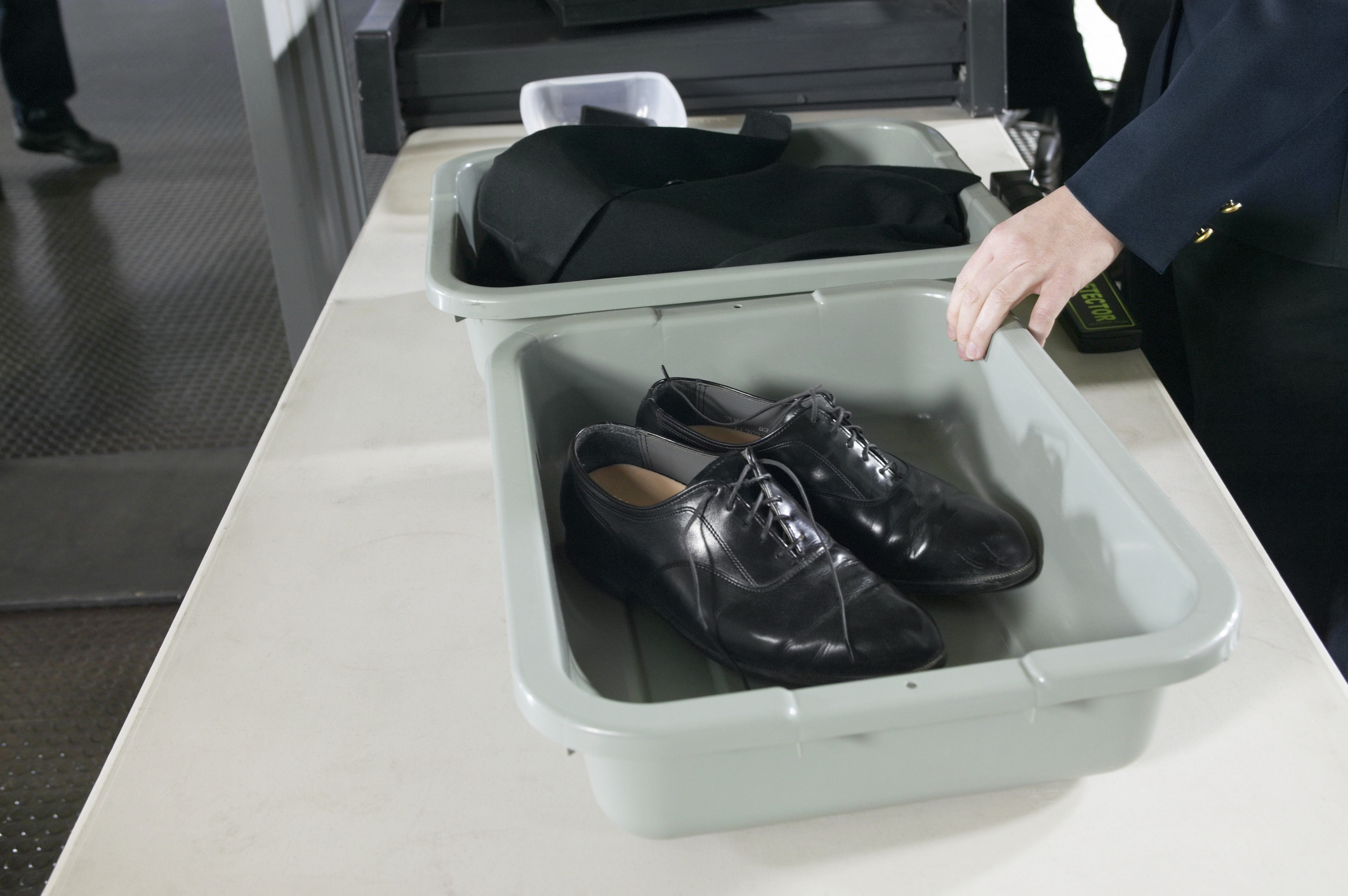The Hated TSA Shoe Removal Rule Was Finally Phased Out
After nearly 20 years, the TSA is ending its shoes-off policy. Travelers will still need a Real ID, and advanced screening remains in place. Here’s what to expect on your next flight.


Profit and prosper with the best of Kiplinger's advice on investing, taxes, retirement, personal finance and much more. Delivered daily. Enter your email in the box and click Sign Me Up.
You are now subscribed
Your newsletter sign-up was successful
Want to add more newsletters?

Delivered daily
Kiplinger Today
Profit and prosper with the best of Kiplinger's advice on investing, taxes, retirement, personal finance and much more delivered daily. Smart money moves start here.

Sent five days a week
Kiplinger A Step Ahead
Get practical help to make better financial decisions in your everyday life, from spending to savings on top deals.

Delivered daily
Kiplinger Closing Bell
Get today's biggest financial and investing headlines delivered to your inbox every day the U.S. stock market is open.

Sent twice a week
Kiplinger Adviser Intel
Financial pros across the country share best practices and fresh tactics to preserve and grow your wealth.

Delivered weekly
Kiplinger Tax Tips
Trim your federal and state tax bills with practical tax-planning and tax-cutting strategies.

Sent twice a week
Kiplinger Retirement Tips
Your twice-a-week guide to planning and enjoying a financially secure and richly rewarding retirement

Sent bimonthly.
Kiplinger Adviser Angle
Insights for advisers, wealth managers and other financial professionals.

Sent twice a week
Kiplinger Investing Weekly
Your twice-a-week roundup of promising stocks, funds, companies and industries you should consider, ones you should avoid, and why.

Sent weekly for six weeks
Kiplinger Invest for Retirement
Your step-by-step six-part series on how to invest for retirement, from devising a successful strategy to exactly which investments to choose.
For nearly two decades, travelers across the country have followed the same routine at airport security: remove your laptop, take off your belt and yes, kick off your shoes. But starting this month, you can leave those shoes right where they belong: on your feet.
The Transportation Security Administration (TSA), under direction from the Department of Homeland Security (DHS), announced that it’s ending its long-standing "shoes-off" policy at airport checkpoints. The change, effective immediately at most major U.S. airports, is part of a broader effort to modernize the passenger screening process and make air travel just a little bit less stressful.
"Ending the 'shoes-off' policy is the latest effort DHS is implementing to modernize and enhance the traveler experience across our nation's airports," said Homeland Security Secretary Kristi Noem in a press release. "We expect this change will drastically decrease passenger wait times at our TSA checkpoints, leading to a more pleasant and efficient passenger experience."
From just $107.88 $24.99 for Kiplinger Personal Finance
Become a smarter, better informed investor. Subscribe from just $107.88 $24.99, plus get up to 4 Special Issues

Sign up for Kiplinger’s Free Newsletters
Profit and prosper with the best of expert advice on investing, taxes, retirement, personal finance and more - straight to your e-mail.
Profit and prosper with the best of expert advice - straight to your e-mail.
Why the shoes-off rule is ending
If you’ve ever wondered why travelers have been required to remove their shoes at airport security, the policy dates back to 2001, when a British man known as the "shoe bomber" attempted to detonate explosives hidden in his footwear during a flight. Since then, shoe removal has become a long-standing and often frustrating part of the airport screening process.
But times, and technology, have changed. Thanks to modern imaging scanners, advanced software and a multi-layered security approach, the TSA says it no longer needs passengers to remove their shoes to ensure safety.
The agency insists that the change will not compromise security and will instead help speed up checkpoint lines, especially during busy travel seasons.
What’s changing (and what’s not) at airport security
While you can now breeze through TSA with your shoes on, other security measures are still firmly in place.
Passengers must continue to:
- Show acceptable identification (REAL ID is now required for domestic flights).
- Go through identity verification and Secure Flight passenger vetting.
- Comply with carry-on screening and liquid rules.
TSA PreCheck members will still enjoy their usual expedited benefits, and the newer "Serve with Honor, Travel with Ease" program, launched earlier this month, offers perks to military families, including PreCheck discounts and fast-lane access at select airports.
A broader shift in airport screening
This policy shift is part of a bigger push by the Trump administration to redefine the airport experience. It's being introduced alongside initiatives like expanded biometric screening and the rollout of digital ID options at select checkpoints.
In May, the TSA completed its full rollout of REAL ID enforcement at U.S. airports, which has already seen a 94% compliance rate. It’s another sign that modernizing security doesn’t have to mean adding more red tape.
A small change with big relief for travelers
After years of grumbling about the shoes-off rule, many travelers are relieved to see it retired. While the policy change may seem symbolic, it represents a larger pivot toward more streamlined air travel.
And for weary travelers just trying to make it to their gate on time, being able to skip the barefoot shuffle at security is a welcome upgrade.
Related Content
Profit and prosper with the best of Kiplinger's advice on investing, taxes, retirement, personal finance and much more. Delivered daily. Enter your email in the box and click Sign Me Up.

Choncé is a personal finance freelance writer who enjoys writing about eCommerce, savings, banking, credit cards, and insurance. Having a background in journalism, she decided to dive deep into the world of content writing in 2013 after noticing many publications transitioning to digital formats. She has more than 10 years of experience writing content and graduated from Northern Illinois University.
-
 Quiz: Do You Know How to Avoid the "Medigap Trap?"
Quiz: Do You Know How to Avoid the "Medigap Trap?"Quiz Test your basic knowledge of the "Medigap Trap" in our quick quiz.
-
 5 Top Tax-Efficient Mutual Funds for Smarter Investing
5 Top Tax-Efficient Mutual Funds for Smarter InvestingMutual funds are many things, but "tax-friendly" usually isn't one of them. These are the exceptions.
-
 AI Sparks Existential Crisis for Software Stocks
AI Sparks Existential Crisis for Software StocksThe Kiplinger Letter Fears that SaaS subscription software could be rendered obsolete by artificial intelligence make investors jittery.
-
 One of the Most Powerful Wealth-Building Moves a Woman Can Make: A Midcareer Pivot
One of the Most Powerful Wealth-Building Moves a Woman Can Make: A Midcareer PivotIf it feels like you can't sustain what you're doing for the next 20 years, it's time for an honest look at what's draining you and what energizes you.
-
 I'm a Wealth Adviser Obsessed With Mahjong: Here Are 8 Ways It Can Teach Us How to Manage Our Money
I'm a Wealth Adviser Obsessed With Mahjong: Here Are 8 Ways It Can Teach Us How to Manage Our MoneyThis increasingly popular Chinese game can teach us not only how to help manage our money but also how important it is to connect with other people.
-
 Looking for a Financial Book That Won't Put Your Young Adult to Sleep? This One Makes 'Cents'
Looking for a Financial Book That Won't Put Your Young Adult to Sleep? This One Makes 'Cents'"Wealth Your Way" by Cosmo DeStefano offers a highly accessible guide for young adults and their parents on building wealth through simple, consistent habits.
-
 My Spouse and I Are Saving Money for a Down Payment on a House. Which Savings Account is the Best Way to Reach Our Goal?
My Spouse and I Are Saving Money for a Down Payment on a House. Which Savings Account is the Best Way to Reach Our Goal?Learn how timing matters when it comes to choosing the right account.
-
 We're 78 and Want to Use Our 2026 RMD to Treat Our Kids and Grandkids to a Vacation. How Should We Approach This?
We're 78 and Want to Use Our 2026 RMD to Treat Our Kids and Grandkids to a Vacation. How Should We Approach This?An extended family vacation can be a fun and bonding experience if planned well. Here are tips from travel experts.
-
 My First $1 Million: Retired From Real Estate, 75, San Francisco
My First $1 Million: Retired From Real Estate, 75, San FranciscoEver wonder how someone who's made a million dollars or more did it? Kiplinger's My First $1 Million series uncovers the answers.
-
 To Love, Honor and Make Financial Decisions as Equal Partners
To Love, Honor and Make Financial Decisions as Equal PartnersEnsuring both partners are engaged in financial decisions isn't just about fairness — it's a risk-management strategy that protects against costly crises.
-
 Top 5 Career Lessons From the 2026 Winter Olympics (So Far)
Top 5 Career Lessons From the 2026 Winter Olympics (So Far)Five lessons to learn from the 2026 Winter Olympics for your career and finances.